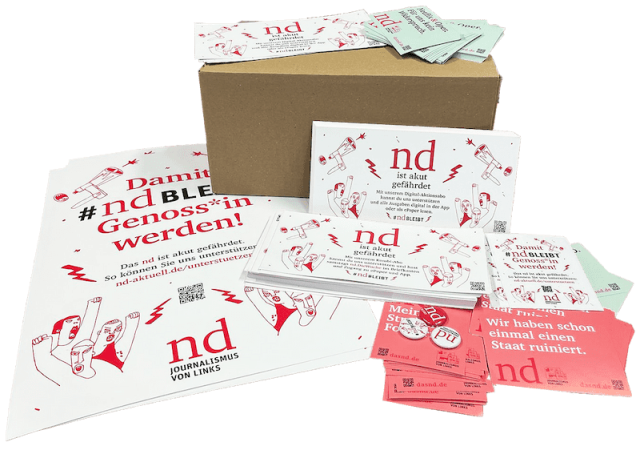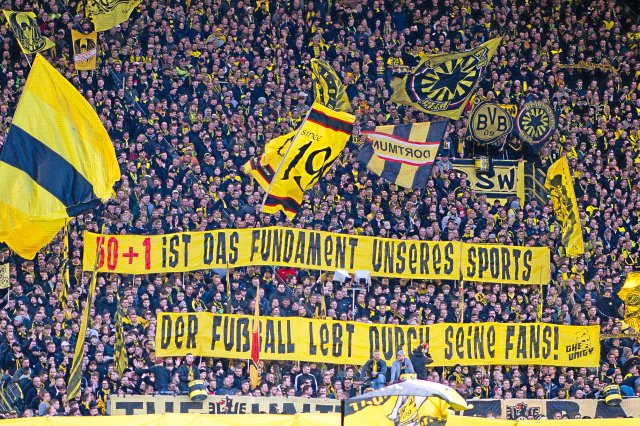After the protest is before the protest: As in Dortmund, the fans continue to be afraid of football being sold out.
Photo: imago/Matthias Koch
At the end of the week, anyone who entered the keyword “tennis balls” into the market leader in online classifieds received over 1,100 hits. However, it was not possible to determine how many of the providers were football fans who had hoarded the balls in order to continue their protests against the entry of a league investor.
As is well known, the neon yellow balls, and thus also the symbol, have become obsolete because the umbrella organization of the 36 professional clubs, the German Football League (DFL), called off negotiations with the controversial private equity company CVC on February 21st. “In the end, this deal was no longer accepted by the majority of the clubs and fans,” said St. Pauli club boss Oke Göttlich as a member of the DFL executive committee: “In this respect, the stop button was right.” That’s how his colleague Axel Hellmann also saw it Eintracht Frankfurt and Borussia Dortmund’s Hans-Joachim Watzke. However, the latter left no doubt on the afternoon of February 21st that the plans to generate more money from foreign marketing would be pursued: “Most people will see that we have to do something if we as the Bundesliga want to do something abroad want to present better.«
The aim of the failed investor deal was to raise over one billion euros in outside capital and in return to transfer up to eight percent of the media rights. On the one hand, a large part of the money raised in this way should have been used to strengthen the league’s foreign marketing. On the other hand, they would have invested in digitalization. The latter because the DFL is convinced, not without reason, that teenagers will no longer be interested in 90-minute games in the future, but will instead want to consume short, elaborately produced snippets.
Hardly any club seems to question the fact that more money is absolutely needed to further develop professional football. Only Christian Keller, managing director of 1. FC Cologne, raises the question of whether German football shouldn’t even think about what it wants to stand for: “If we knew what we want, for example, it would be clear whether we really want to get higher We need media revenues.« At the moment, hardly anyone on the fan side has any illusions that the next attempt to generate more external capital won’t be made soon. The DFL had estimated 600 to 700 million for the investments, and they will try to raise money of this magnitude in the next attempt. After the disaster surrounding the failed CVC entry, there seems to have at least been a greater willingness to discuss alternative models in the clubs beforehand.
However, it is probably only about the modalities of “faster, higher, further”. It’s not about the question of whether the majority of first and second division teams really benefit from internationalization. Or even whether a business model that is financed on credit has a promising future. In any case, hardly anyone remembers the humility promised by professional football during the Corona crisis. For example, the assurances of wanting to reduce the ever-increasing player salaries remained just empty words. “Football is obviously not ready to take a step back yet,” says Michael Becker, managing director of Karlsruher SC. »If Corona came again, many clubs would probably have the same existential problems again. Unfortunately, even today, the answer to all challenges is often that more money is needed.«
The DFL’s main concern at the moment is something else: that major clubs like FC Bayern will come up with the idea of leaving central marketing under the umbrella of the league association after the deal fell through. While the record champions are currently holding back publicly, Fernando Carro, managing director of Bayer Leverkusen, has already suggested that in the future each club should decide for themselves whether they follow the 50+1 rule or not.
What is currently happening at SV Werder Bremen is also interesting. There, eight companies and private investors came together around long-time player and managing director Frank Baumann and acquired around 18 percent of Spielbetriebs-GmbH & Co KGaA for 38 million euros. The third division club Arminia Bielefeld is also supported by the local network “Alliance Ostwestfalen”. Such models have the advantage that they are easier to convey to critical fans; the protests in both Bremen and Bielefeld were kept within narrow limits.
Things are different at VfB Stuttgart, where Porsche AG acquired 10 percent of the shares for 41.5 million euros. The fundamental dilemma surrounding investor entry can currently be clearly observed in Swabia: Anyone who invests so much capital generally does not find democratic control and the votes of general meetings to be beneficial. At VfB, a bitter dispute is currently raging behind the scenes about who will chair the supervisory board in the future: Will Claus Vogt, the club president, be elected with 92.3 percent? Or a candidate who is more comfortable with Porsche?
A book by the author will be published on the subject next week. Christoph Ruf: Enough said! The wrong paths of the Bundesliga and the inconsistency of the fans. The Workshop, €22.
#ndstays – Get active and order a promotional package

Regardless of whether it is pubs, cafés, festivals or other meeting places – we want to become more visible and reach everyone who values independent journalism with an attitude. We have put together a campaign package with stickers, flyers, posters and buttons that you can use to get active and support your newspaper.
To the promotional package
sbobet judi bola sbobet88 akun demo slot
